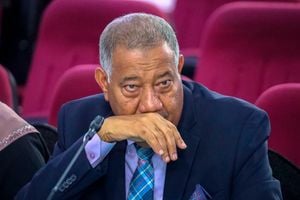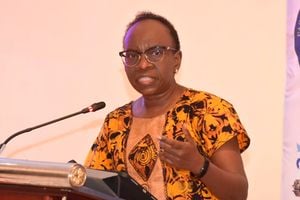
The National Assembly during a past session.
The politics of administration of Road Maintenance Levy Fund (RMLF) at the constituency level is undermining efforts to resolve a stalemate on counties’ cash between the National Assembly and Senate.
This came after a mediation committee on the Division of Revenue (Amendment) Bill 2024 that draws equal membership from National Assembly and Senate, at a meeting on November 12, 2024, failed to agree on the figure that should be equitably allocated to the 47 counties.
While the National Assembly wants Sh380 billion allocated to the counties, the Senate wants Sh400.1 billion as the push and pull between the two Houses threaten the financial situation in the devolved units.
Although the National Assembly is willing to cede ground, it has imposed a condition that the Senate engages the Council of Governors (CoG) to withdraw a case filed in court challenging the control of part of RMLF proceeds by MPs at the constituency level.
But the Senate is reading mischief from the proposal by the National Assembly terming it selfish and therefore, not genuine as it wants it portrayed.
“The undercurrent of the division of revenue is not that of agreeing on the figure but the politics of the two Houses regarding the RMLF. We need to find a solution to unlock the funds to the counties,” said Mandera Senator Ali Roba, a co-chair of the committee.
Senator Roba’s refusal to engage the CoG followed a request from Funyula MP Dr Wilberforce Oundo.
“The issue of the Senate talking to CoG is not an assignment we are going to take because we are not darlings with governors as you may perceive,” maintained Senator Roba.
“It is an exercise in futility to expect as to engage the CoG over the politics of the National Assembly and the CoG regarding RMLF and this reality has to be in black and white,” he added.
The mediation committee, which first sat on November 7, 2024, has 30 days from the date of the first meeting to produce a mediated version of the Bill.
What has irked the National Assembly is that the CoG wants Kenya Roads Board (KRB) restrained from disbursing the Sh10.5 billion being proceeds of the RMLF, to the Kenya Rural Roads Authority (Kerra) that is managed at the constituency level. In the event the committee fails to come up with a mediated version of the Bill, the Bill will be lost.
The Bill seeks to amend the Division of Revenue Act of 2024 to reduce the allocation to counties in equitable share from Sh400.1 billion to Sh380 billion following the unprecedented rejection of the Finance Bill 2024 by President William Ruto.
The withdrawal of the Finance Bill 2024 resulted in a revenue shortfall of Sh346 billion that led to a reduction of the national government’s expenditure by Sh156 billion in the current financial year and counties’ equitable share by Sh20 billion.
The balance of Sh171 billion was to be financed through additional borrowing from the local and foreign market.
As the two Houses flex muscles over the Bill, some county staff have not been paid for months now with critical services like health, water among others bearing the brunt of the delayed disbursement.
The national government is pushing for the reduction of the counties’ share on the basis of reduced revenue collected at the national level.
For instance, in the current financial year, the government had projected to collect Sh3.0 trillion in ordinary revenue and Appropriation in Aid (AiA), which was revised to Sh2.6 trillion following the rejection of the Finance Bill 2024 though it remains unclear whether the projected revenue will be realized.
In the last financial year- 2023/24- the government had Sh2.9 trillion in revenue projections but would later be scaled down to Sh2.7 trillion due to missed revenue targets.
During the committee meeting on Monday, it became apparent that if the National Assembly and Senate fail to get a common ground, the Bill will stand lost.
In the event the Bill is lost, it means that the Sh400.1 billion allocated to the counties in the Division of Revenue Act 2024 will prevail, giving the President the headache of finding the extra Sh20 billion to finance the counties’ operations.
In the event the committee agrees with the Senate on the figure of Sh400.1 billion, it will be taken to the president for assent in line with Article 115 of the constitution, which also allows the president to return it with a memorandum expressing his reservations on the areas he wants changed.
In this case, the two Houses will be required to raise at least two-thirds- of the 349 MPs in the National Assembly and 47 delegation heads in the Senate- to veto the Presidential memorandum on the Bill.
While rejecting the Finance Bill 2024, the president also declined to sign the County Allocation of Revenue Bill 2024 and instead sent it back to parliament with a memorandum seeking a variation of the horizontal share of the Sh400.1 billion among the 47 counties.
Alternatively, the committee has a chance to agree with the Sh380 billion figure as passed by the National Assembly in the Bill and unlock the stalemate.
Rarieda MP Dr Otiende Amollo faulted the implementation of the presidential veto power on Bills enacted by parliament.
“We have to agree in order to persuade our Houses to agree with us. Otherwise, it will be a dereliction of duty. The way we implement the presidential veto over Bills is that we give the president the power to make laws which was not contemplated in our constitution,” said Dr Amollo.
As the impasse over the counties’ billions drags on, the Senators are questioning the drastic reduction of the counties’ funds saying it is unconstitutional.
Their argument is anchored on Article 219 of the constitution which states that a county’s share of revenue raised by the national government shall be transferred to the county without undue delay and without deduction.
The exception is however allowed if the transfer has been stopped under Article 225 of the constitution.
The Senators’ push to protect the counties allocation is also anchored in section 5 of the Division of Revenue Act 2024, which states that any shortfall in revenue to be shared among the two levels of government shall be borne by the national government.
But the National Assembly is seeking the concurrence of the Senate to vary the section and vary its implementation.









